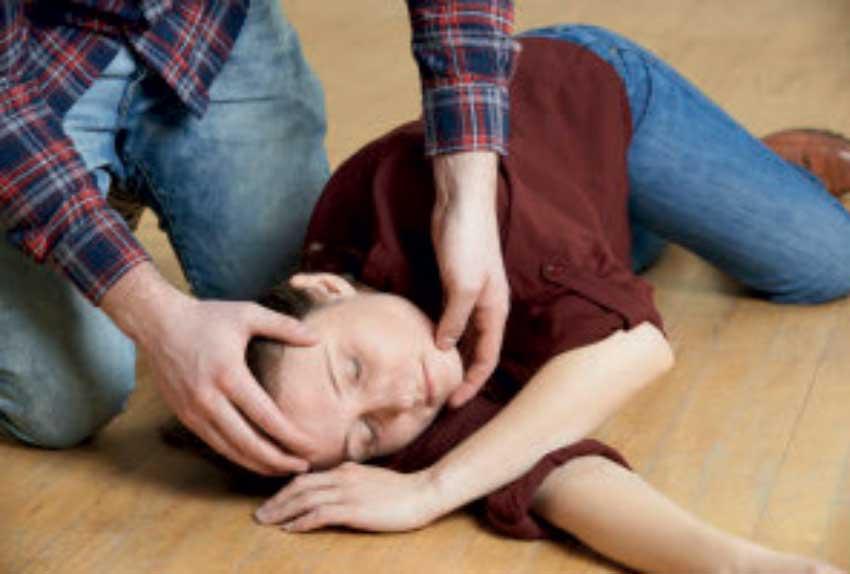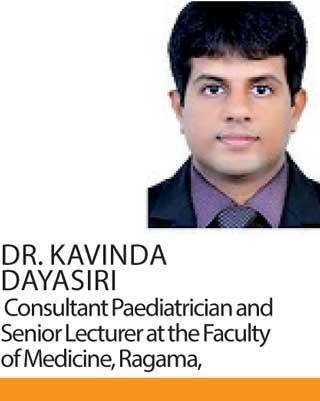Reply To:
Name - Reply Comment

 ‘Fever fits’ is a relatively common childhood condition in very young children. While it rarely affects a child’s growth and development there are many myths obscuring this condition, giving it a sinister aura. In this issue of Health Capsule we have consulted Dr. Kavinda Dayasiri, Consultant Paediatrician and Senior Lecturer at the Faculty of Medicine, Ragama, to enlighten readers on this condition.
‘Fever fits’ is a relatively common childhood condition in very young children. While it rarely affects a child’s growth and development there are many myths obscuring this condition, giving it a sinister aura. In this issue of Health Capsule we have consulted Dr. Kavinda Dayasiri, Consultant Paediatrician and Senior Lecturer at the Faculty of Medicine, Ragama, to enlighten readers on this condition.
Causes
Convulsions that occur in association with fever are called febrile convulsions and these convulsions typically present in otherwise healthy children aged between 6 months to 5 years. Most of the time fever occurs secondary to viral infections. However, bacterial infections such as pneumonia, ear infections, tonsillitis and kidney infections also can occasionally give rise to febrile convulsions.
Treatment
Febrile convulsions which persist beyond 5 minutes need immediate treatment. The convulsing child is kept on a side with head tilted backwards to clear the airway. All children with ongoing convulsions need oxygen and it can be delivered through a face mask.
Medications called benzodiazepines are given into either the back passage or inside of the mouth of your child in the absence of direct access to blood stream. These medications help to terminate convulsions earlier. However, if the convulsion does not stop, the doctor may decide to repeat the same medication and may even administer stronger medications directly to the blood stream to bring down the convulsion under control. Rarely, longer lasting convulsions that last beyond 30 minutes may necessitate your child’s doctor to administer medications to paralyse your child’s body and put them inside a breathing machine until the convulsions are completely under control.
What you should do for your child
It’s important to note the time of onset of the convulsion as most medications used to control the convulsion are administered around the clock. Keep the child on their side with their head tilted backwards slightly as this position helps clear their airway. It is important not to shake the child and not to put anything in their mouth or hands as this can lead to injuries.
Always stay with child and make sure the child is out of any danger. Closely watch what is happening as this information may help the doctor decide the best course of action to manage the convulsion. If the convulsion lasts for longer than 5 minutes, it is important to either call for an ambulance or to bring the child immediately to hospital. If the convulsion stops within five minutes and child recovers well, you can offer the child a drink and a dose of paracetamol; if it was not given within past six hours. This will help the child to be kept in comfort. Keep the child very lightly dressed or take all their clothes off if the room is warm.
Prevention
The best way to prevent febrile convulsions is to prevent your child from developing frequent viral infections. Regular hand washing and preventing exposure to infections by avoiding crowded places are effective measures that can control the spread of viral infections. If your child is having iron deficiency treatment with iron also help reducing the future risk of febrile convulsions.
Do children with febrile convulsions develop seizures as adults?
Most children grow out of convulsions beyond 5 years of age. Children with febrile convulsions further make full recovery with no after effects. Intelligence, academic achievement, behaviour and working memory are similar to children with no history of febrile convulsions. This means that children with febrile convulsions will grow up as healthy neurologically normal individuals. Therefore, what children with febrile convulsions and their parents need is clear explanation of these facts and reassurance.
Take home message
Febrile convulsions are not a type of epilepsy. They are more common and seen in otherwise healthy children aged between six months to five years. Given the harmless nature and absence of any after-effects, anticonvulsants are often discouraged in the management. It is important to use paracetamol and tepid sponging only as comfort measures as neither will prevent recurrence. Do not use other antipyretics such as ibuprofen as your child may have dengue as the cause of fever and use of ibuprofen in dengue is harmful. The most important action is to arrange transfer of your child to hospital if the convulsion lasts beyond 5 minutes and not to attempt any potentially harmful remedies. A clear understanding of the long-term harmless outcomes helps avoid unnecessary use of anticonvulsants and aids achieving a better quality life for both you and your child.